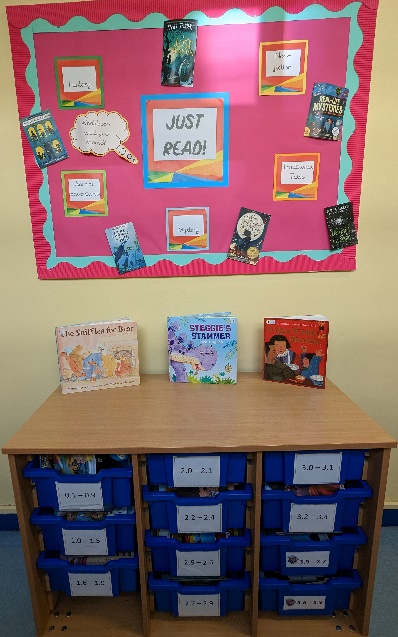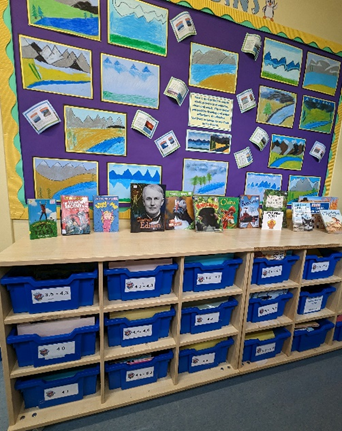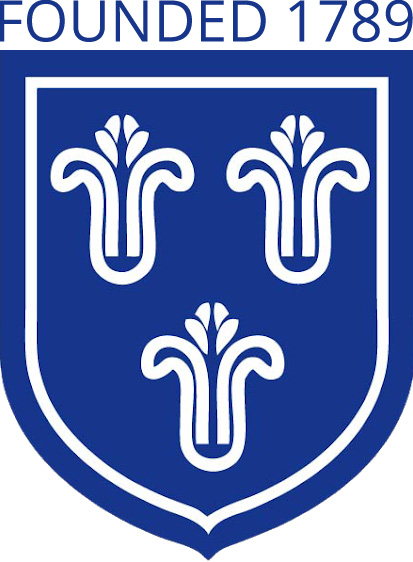English/Mathematics
English:
At St. Mary's CEP, English and the teaching of English is the foundation of our curriculum. Our main aim is to ensure every single child becomes literate and progresses in the areas of reading, writing, speaking and listening.
English is not only a daily discrete lesson, but is at the heart of the entire curriculum. By embedding this within all our lessons, we strive for a high-level of English for all. Through using high-quality texts, immersing children in vocabulary-rich learning environments and ensuring new curriculum expectations and the progression of skills are met, the children will not only enable them to become literate, but also develop a love of reading, creative writing and purposeful speaking and listening.
Writing:
As we believe consistency and well-taught English is the bedrock of a valuable education, we ensure that the teaching of writing is purposeful, robust and shows clear progression for all children. In line with the National Curriculum expectations, we ensure that each year group is teaching the explicit grammar, punctuation and spelling objectives required for that age group, facilitated by the use of a variety of resources including Talk for Writing. From the earliest stages of emergent writing, we aim to foster a true love of storytelling and writing through the joy it is able to bring.
We recognise the role that ‘talk’ plays in our understanding of the written word and so, through ‘Talk for Writing,’ children are regularly given opportunities to listen to and retell stories and non-fiction texts. Through retelling texts, using actions or drama to help internalise patterns, children are able to first imitate, but then innovate and invent their own version of a text. Children are supported in their ability to innovate upon a known text through shared and guided writing, whilst the invention stage teaches children the subtleties of an author’s craft.
Children are encouraged to reflect on their own learning, and the learning of their peers, and to edit and improve their writing as a direct result.
Reading:
Children in Class R and 1 learn Phonics and reading daily using the 'Success for All' programme (accredited systematic synthetic phonics scheme). This is a systematic approach which uses synthetic phonics; the programme focused on repetition of sounds and reading using sounds with which the children are already familiar with (essential for reading and writing). Using a continuous and a variety of assessment methods, reading is further developed by providing children with a book appropriate to their reading level and phonic knowledge using pure decodable books.
Once these skills are secured, discrete lessons for reading are incorporated into the morning session for all years from 2 to 6. This ensures that Reading is explicitly taught every day. With a structured plan of learning tasks used throughout the week, children are not only learning comprehension skills but also independence and a love of wider reading and exposure to rich vocabulary - this is absolute key in all sessions for all learners.
We further develop our readers using ‘Accelerated Reader' which provides books appropriate to each child’s word knowledge and checks for understanding through comprehension questioning linked to the National Curriculum domains; we encourage our children to take home and share these books with their parents/ carers.
Accelerated Reader
At St. Mary’s Church of England Primary school, we are committed to nurturing a love of reading in all children. In KS2 classes, we use Accelerated Reader as a motivational tool, as well as a means of accurately assessing all children to make sure their book is appropriately matched to their level of understanding.
What is Accelerated Reader?
Accelerated Reader (AR) is a computer program that helps teachers to manage and monitor children’s independent reading practice. Your child picks a book at his/her own level and reads it at his/her own pace. When finished, your child takes a short quiz on the computer - passing the quiz is an indication that your child has understood what has been read.


Our KS2 children choose from a wide range of books including: fiction, non-fiction and poetry.
Each term, children will take a 'Star Reader test' which gives them an accurate reading range (called a ZPD – Zone of Proximal Development) based on their comprehension and vocabulary skills. Children can choose from a range of books matched to their reading range.
Children can earn points for these quizzes over the course of the year and also monitor how many words they read. There is also a competitive element in school as classes compete against each other for the most quizzes passed each week! The winning classes are announced each week in Celebration Collective Worship and win the award of being our ‘Word Wizard’ or our ‘Word Owl’.
Accelerated Reader gives both children and teachers feedback based on the quiz results, which the teacher then uses to help the child set targets and support their learning.
How can you help?
As with anything, performance improves with practise. According to research, children who read at least 20 minutes a day with a 90% comprehension rate on Accelerated Reader quizzes see the greatest gains.
Encourage your child to read at home, discuss books, ask questions about what they have read and visit your local library.
Click here to download a parent’s guide: https://www.renlearn.co.uk/wp-content/uploads/2020/03/Parents-Guide-to-Renaissance.pdf
Mathematics:
“A high-quality mathematics education … provides a foundation for understanding the world.” National Curriculum 2014
At St Mary’s CEP, a mastery approach to teaching and learning in Mathematics has been adopted. With this approach, we aim to give pupils a deep, long-term, secure and adaptable understanding.
To support children in achieving this, we use the White Rose Primary Scheme of Learning; this is used to both support and challenge children’s understanding, in line with the high expectations of the National Curriculum and the 'Ready to Progress' criteria and guidance materials.
We believe that together, both staff and children are building a whole new culture of deeper understanding, confidence and competence in Maths – a culture that produces strong, secure learning and real progress: learning where everyone can master!
